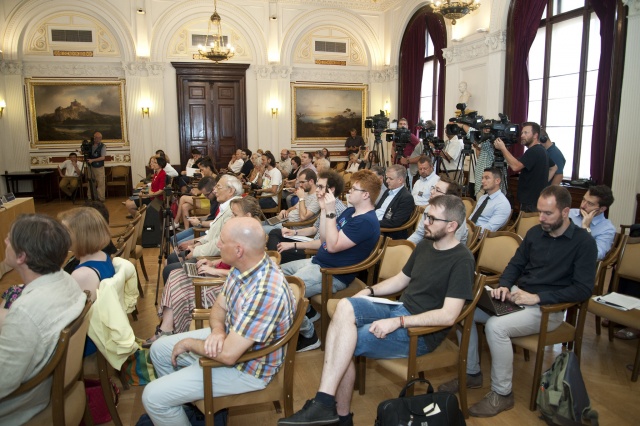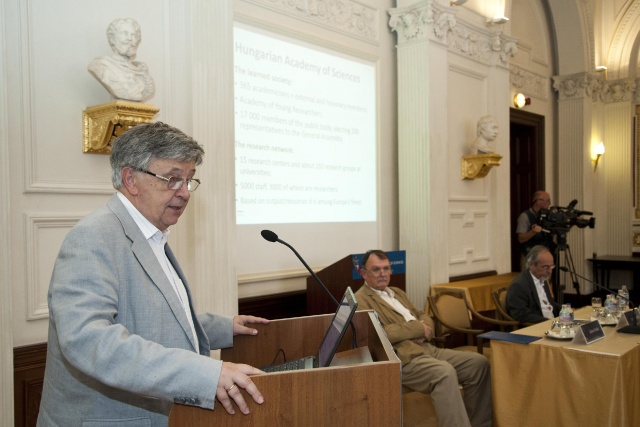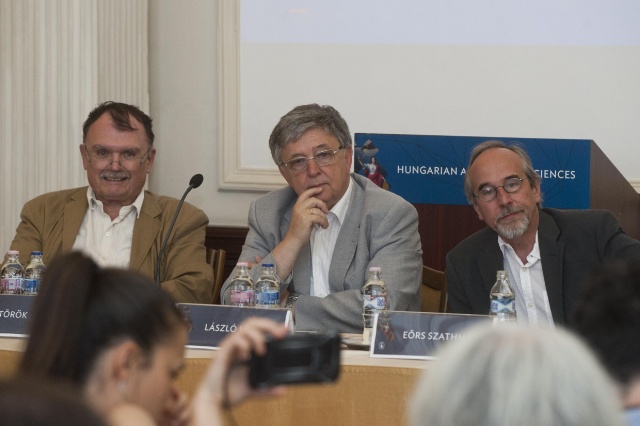International press conference at the Academy
The Hungarian Scientific community has made it clear that they refuse the Government’s draft bill regarding the Hungarian Academy of Sciences. László Lovász, President of MTA, indicated in his speech that the planned institutional and financing framework goes against European principles of research funding and threatens academic freedom. The president added that passing the draft bill would not increase the innovative capacity of Hungary, while an unbalanced role for government priorities and control in science may soon become an alarming example that may be copied by other governments in the EU.
June 12 2019
It was exactly one year ago today when the Academy received an email from the Ministry for Innovation and Technology regarding a new law amendment. The government provided a mere 54 minutes for an evaluation of the proposed changes that would fundamentally affect the operation of the Academy.
During the last year we made the utmost effort to keep the debate between MTA and ITM on professional grounds. Meanwhile, members of our 5000-strong research network felt a steadily growing unease because of the events, costing the Academy some of its best researchers and pushing more to the brink of leaving.
We kept on negotiating relentlessly, but our efforts proved futile. The Ministry for Innovation and Technology submitted its draft bill, which was most likely being discussed during the exact same time this very press conference was taking place.
 Guests at the international press conference
Guests at the international press conference Photograph: mta.hu/Szigeti Tamás
Following is a summary of President László Lovász's speech during the press conference.
Government plans on a "new" research network
The backbone of the Government’s plan is to strip the learned society of the MTA of all its research institutions, and create a new one under the name „Eötvös Loránd Research Network” (ELKH). The operation of ELKH will be controlled by a Governing Board with delegates from the Ministry of Innovation and Technology and the Academy in equal numbers (6+6) and a jointly selected president, while all members would be appointed by the Prime Minister. The “new” research network will use existing properties of the Academy, a part of its existing central administration and its successful grants and fellowships for its operation. State support will be maintained, but no guarantees for basic operational cost (staff and tenured researchers, etc.), previously guaranteed by the Academy law.
Forced transformation without any valid reasoning
The MTA has been successful in running its research network, as proven unwaveringly by the fact that based on output/resources it ranks among Europe’s finest. Besides, the MTA is responsive to new challenges, it has prepared several strategic documents that comply with government demands for boosting innovation. In contrast however, the Government has not presented any strategy that could justify the separation. The often mentioned low innovation performance will not be improved by putting a successful basic research network under government control.
 László Lovász at the press conference Photograph: mta.hu/Szigeti Tamás
László Lovász at the press conference Photograph: mta.hu/Szigeti TamásWhy should the research network stay with the Academy?
Contemplating this question one can point out the well established high level quality control, important synergies between research institutes and the learned society and the internationally recognized „brand” of the Academy. Furthermore, the separation of the research network from the Academy would cause an extremely complicated legal situation, let us just consider the number of existing contracts.
Why should the network be separated from the Academy?
The Government gave no viable reasons for the separation. The exact rationale behind the creation of this new system is still a mystery to this day, also there is no indication how these changes would benefit Hungarian science.
Stronger government control
While reasons and foreseeable benefits are seemingly lacking, there is an obvious increase in government control. The Governing Board has a 50% Government representation, all decisions are made by simple majority voting. No representation is guaranteed for members of the research network. National RDI priorities are set by the Minister of Innovation and Technology advised by the National Science Policy Council all members of whom are invited by the minister and only 1/3 of them are scientists. Last but not least, national RDI funding is distributed by the National Research Development and Innovation Office under the control of the Minister of Innovation and Technology.
 Ádám Török (left), László Lovász (middle) and Eörs Szathmáry at the press conference Photograph: mta.hu/Szigeti Tamás
Ádám Török (left), László Lovász (middle) and Eörs Szathmáry at the press conference Photograph: mta.hu/Szigeti TamásNo guarantees for basic funding
Government control aside, the new system does not provide a stable basis for research. In contrast to the guarantees described in detail in the Law on the Hungarian Academy of Sciences, basic funding to cover the cost of permanent staff, long-term contracts, etc. are not laid down in the new law. The research network will be increasingly reliant on project-based funding available for government priorities. Long-term research agendas, blue sky research and any research beyond government priorities will be increasingly difficult to follow.
Highly questionable methods in the course of negotiations
While the MTA has been trying to participate in the negotiations in a constructive and professional way, the same could not be said of its governmental negotiating partners. The series of unfriendly moves began with a 54 minute deadline to give expert opinion on the amendments of the law on the Hungarian Academy of Sciences in 2018. The research budget of the Academy was promptly transferred to the ITM last summer and during the following months several attempts were made on the Government’s side to unlawfully withhold the release of funds. The Government has disregarded resolutions of joint ITM-Academy committees, and also ignored the proposal of the General Assembly of the Academy providing more room for government involvement in the research network.
Conclusions – a system unsuitable for the research community and against European principles
The above elaborated Government plans were clearly and loudly refused by the Hungarian scientific community, some of the most excellent researchers have already left the country. The separation of the two missions of the Academy will inhibit the preservation of existing synergies. The new institutional and financing framework is against European principles of research funding and threatens academic freedom. Besides, a change in the name and government control will not increase the innovation capacity of the country. There is also a concern, that an unbalanced role for government priorities and control in science may soon become an alarming example that could be followed by other governments in the EU.
In response to a journalist’s question president Lovász stated that for him the first priority is that the necessary conditions be provided for the continuous operation of the research network. Alongside the better-known issue of researcher emigration, László Lovász directed the attention to a more elusive group of scientists hesitating to return or move to Hungary because of the current situation.
On seeking the roots of the misunderstandings, the president remarked that the difference between policy and politics is not always understood by decision makers. Researchers are quite willing to give expert advice to politicians, however for this to work seamlessly specific communication channels are required.
As for the possible role of EU-institutions in the debate between the ministry and the Academy, Mr. Lovász said that direct support cannot come from their direction, however some elements of the draft bill could be altered as a consequence of international attention.
All press materials, including photos and video footage of the event are available here.
